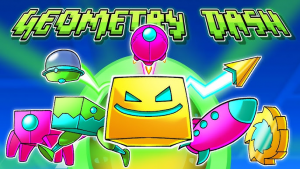About Us
The Birth of Geometry Dash
Geometry Dash was created by Robert Topala, a Swedish game developer known online as RobTop. It was released by RobTop Games in August 2013 for iOS and Android devices, with later versions arriving on Steam. The game was built using Cocos2d, a 2D game development framework, and initially had only seven levels.
Topala’s goal was simple: to make a one-button rhythm-based platformer that anyone could play — but not everyone could master. He wanted a game that looked simple yet demanded precision and skill. The result was Geometry Dash, a game where timing is everything and mistakes are instantly punished.
Despite its minimal graphics and lack of story, the game’s addictive nature and catchy electronic soundtrack quickly turned it into a global hit. Over time, Geometry Dash expanded with new levels, updates, and a passionate community that helped it evolve beyond its original scope.
How the Game Works
At its core, Geometry Dash is a rhythm-based action platformer. The player controls a geometric shape — usually a cube — that automatically moves forward. Your only job? Jump, fly, and flip to the beat of the music while avoiding spikes, saw blades, and other deadly obstacles.
You control the cube by tapping the screen or pressing a key (depending on your platform). Each tap makes your cube jump, and that’s all you can do. Yet, the simplicity is deceptive — every level is meticulously synchronized with its soundtrack, and every jump must be perfectly timed.
A single mistake sends you back to the very beginning of the level. There are no checkpoints, no continues, and no mercy. Success depends entirely on memorization, rhythm, and precision.
Levels and Modes
The main version of Geometry Dash includes over 20 official levels, each with its own unique music and design. The difficulty ranges from Stereo Madness (easy) to Deadlocked and Theory of Everything 2 (insanely hard). Each level introduces new mechanics — like gravity shifts, portals, flying sequences, or changing forms — keeping gameplay fresh and unpredictable.
